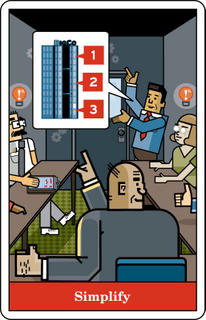 When you are presenting information, how do you determine what to leave in and what to leave out? It can be difficult, especially if what you want to communicate is complex or potentially confusing.
When you are presenting information, how do you determine what to leave in and what to leave out? It can be difficult, especially if what you want to communicate is complex or potentially confusing.As you think through your presentation, turn the situation around in your head. Think about the person you are presenting to and try to imagine the meeting from their perspective: Where does the meeting fall on their priority list? Think about the other things on their plate. If you were that person, how much time would you want to devote to this issue? How much energy or attention would you be willing to commit to understanding?
The amount of information you include should be in direct proportion to the amount of time and attention you expect from your audience. Someone who is highly interested in the subject matter – a technical reader, for example – will enjoy deep and textured content, with many layers and shades of meaning. One who is less interested, for example, a sales prospect, will prefer a brief, simple picture or description that he can understand as quickly as possible.
Know in advance how much time your reader is willing to invest, and design your presentation accordingly. When in doubt, leave it out.
Nobody will ever complain that your presentation was too short.
Keep in touch! Sign up to get updates and occasional emails from me.
2 comments:
Great suggestions! I'd also recommend reading Why Business People Speak Like Idiots. Since reading it I have found that my presentations are much shorter and my meetings are much more productive.
This looks great -- I just ordered it.
Post a Comment